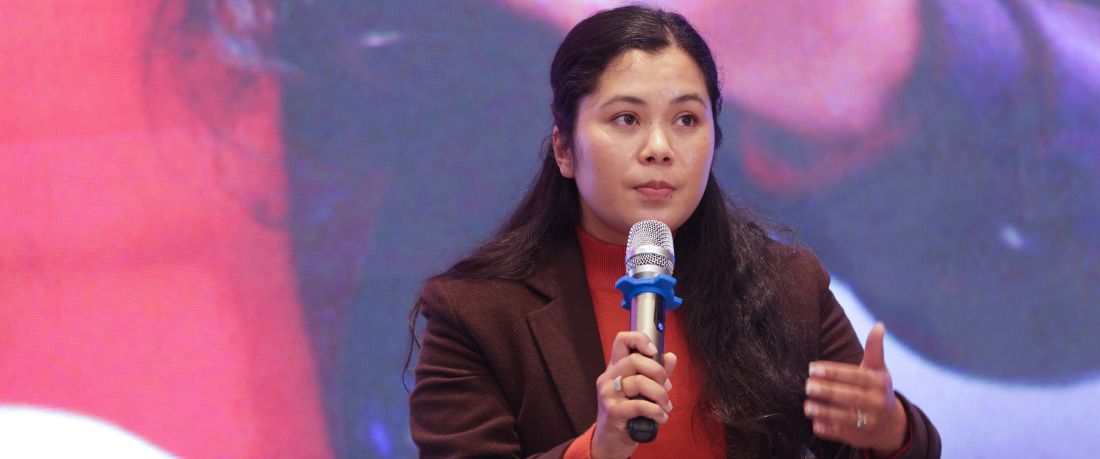Following a decade of civil war and several years of socio-political strife in the war’s aftermath, Nepal enacted its Constitution in 2015, to anchor its fledgling democracy, and bring about peace, stability, and social change to the region. The 2015 Nepalese Constitution – heralded by many as a progressive force for human rights – guarantees to the people of Nepal 31 fundamental rights, including core Economic, Social And Cultural Rights (ESCR). Recognising the importance of activating and entrenching the promises of the 2015 Constitution, especially those regarding ESCR, iProbono launched the ESCR Fellowship in 2018 to mobilise the legal community in Nepal to engage and oversee its sensitive implementation.
In 2022, Roshani Giri, a human rights and environment lawyer, who read law at Cambridge, joined iProbono as an ESCR Fellow.
What inspired Giri to take up law, what is she working on as an ESCR fellow, and what according to her are the barriers to fulfilment of ESCR in Nepal? She spoke about all this and more in an interview with Madhulika T, program officer at iProbono India. Here are some excerpts:
What inspired you to pursue public interest lawyering?
The ability of law to bring about social change is what attracted me to it as a career. For me, the power of law comes from the fact that it can be both a tool and a weapon to push the State to act on its commitments to its people. Often, when issues cannot be resolved through discussions with government authorities and state officials, I have found that filing a Public Interest Litigation (PIL) before the court forces the State to act on its promises.
You have been closely involved in promoting legal education, particularly on constitutional rights of women, for school students in Nepal. Can you tell us more about your work in this area and why you think legal education is important for school students?
When I first heard that ignorance of law is no excuse, it came as an enormous shock to me. Personally, I only learnt of various laws after I began my legal training. For people to follow the law, they need to know the law, especially children. For instance, in Nepal, if minors – people under 18 years of age – engage in physical relationships, regardless of it being consensual, it is a crime. Most minors do not know this, and are forced to confront the criminal justice system at a young age, for no reason other than their lack of knowledge of the law. I strongly feel that imparting legal education to minors is necessary for them to understand what actions constitute a crime under the law, and the rights they possess when they come in contact with the criminal justice system.
I am involved in promoting and imparting legal education across Nepal schools via various roles. As a part of my work with the Asia Foundation, I recently trained a cohort of fellows on the rights of women under the Constitution of Nepal, including the right to education.
What areas of work under the broad umbrella of ECSR are you passionate about pursuing in the course of your fellowship?
In Nepal, a woman can get her marriage registered only using her husband’s permanent address, and not her own. This is the same for other personal events, including when a married woman gives birth to a child or even when she wants to get a divorce from her husband. This not only constitutes gender-based discrimination, but is also a violation of a person’s right to residence and right to life. I would argue even further to say that this is discrimination between married and unmarried women, because as an unmarried woman I can get personal events registered at my own address, and not through any other person’s. This is an issue that has personally affected me as a married woman and is an area of work I will be analysing and intervening in through the course of my fellowship.
Your fellowship is a blend of different ‘access to justice’ tools like litigation, research, and advocacy. How do you plan to strategically use these different tools to ensure maximum impact?
As part of my fellowship, I will be writing an article every quarter on ESCR. The research we conduct and the articles we write will be useful for advocacy both within and outside the judiciary. Wherever possible, we will have stakeholder meetings to see if the problem behind the implementation of ESCR is a lack of bureaucratic resolve and if it can be solved via advocacy with various government bodies. If the problem is one which cannot be solved at the bureaucratic level or calls for an amendment in the law itself, then we will use litigation as a tool to resolve the issue.
How relevant is the ESCR jurisprudence of courts in foreign countries including India, Latin America, and South Africa to the development of ESCR legal jurisprudence in Nepal?
Though judgments from other countries do not have authoritative value before the courts in Nepal, the courts are nevertheless open to them. Jurisprudential trends from other parts of the world are a source of inspiration for courts in Nepal. For instance, in the environment-related cases, we have filed in Nepal, we cite MC Mehta’s judgments frequently and the courts have almost always viewed these citations favourably.
What are the main barriers to fulfilling economic, social, and cultural rights in Nepal’s Constitution?
In Nepal, most ESCR are fundamental rights. However, for these rights to be activated, the State must make necessary rules and regulations. This has not been done by the State of Nepal for many crucial rights including the right to sexual and reproductive health. The lack of willingness of the State to implement ESCR is a huge barrier to its fulfilment.
Another problem is the financial ability of the State to provide for the realisation of ESCR. While the courts can be moved seeking directions that the State introduce rules and regulations to implement ESCR, there is a possibility that the court might say that any claim to an ESCR is contingent on the State’s financial ability to provide for the implementation of the right. When the court makes such a pronouncement, it becomes easy for the State to make excuses and escape its obligations under the Constitution.
What do you think are the key components to ensure success in strategic litigation?
For a strategic litigation case to succeed, it primarily requires clarity of vision. What do we want as an end result of the case? What do we specifically seek to achieve as an end result? Are we looking for the law to be completely scrapped, or for it to be amended? These are some of the questions that need to be considered before filing a strategic case.
Strategic litigation also needs to be looked at holistically, to achieve broader impact. For instance, when I was researching the patriarchal undertones in the law for marriage registration, I realised that this is a problem not just with marriage registration, but also with other personal events like divorce registration and the birth registration of one’s child. Crafting a petition that addresses not just one specific component, but several interrelated issues will ensure a well-rounded impact.
Needless to say, any strategic petition being filed before the court must be research intensive and have a wealth of evidence that supports its claims.
Who are the public interest lawyers you admire, and why?
One of the lawyers that I admire and often cite in the cases I file in Nepal is MC Mehta, a prominent environment lawyer from India. He is a well-known figure in the Nepal judiciary and is popular to an extent that when lawyers cite his work, they often do not have to offer any additional background to him or his work, because of how well-known he is.
Another lawyer I am inspired by is Mr Prakash Mani Sharma, a renowned environmental lawyer and an environmental conservationist from Nepal. He has a two-decade-long practice, and only practices in the field of environment law. His unrelenting focus and commitment to environment issues in Nepal are a huge source of inspiration to me. It is thanks to his work that the Kathmandu Valley continues to have a pristine forest cover and the people in Nepal, fresh air to breathe.
How does this fellowship influence your future career plans?
Many issues, including that of marriage registration, which I will be focusing on during my fellowship, were topics I was already familiar with and researching on. But now with organisational backing of the ESCR Fellowship and iProbono, I feel that I am better placed to strategically ensure impact in this area.
The fellowship has also given me access to a wealth of new resources and people whose perspectives I will carry with me into the future for all work.
What are your future career plans?
I am currently both a legal academic and part-time litigating lawyer. In the near future, I would like to get my PhD. Presently, I am exploring different areas of interest to see which topic I can devote four to five years of my PhD time to.
Madhulika T – Program Officer, iProbono India.
Featured photo by Wikipedia Commons.
Thumbnail photo by UNICEF Nepal.







